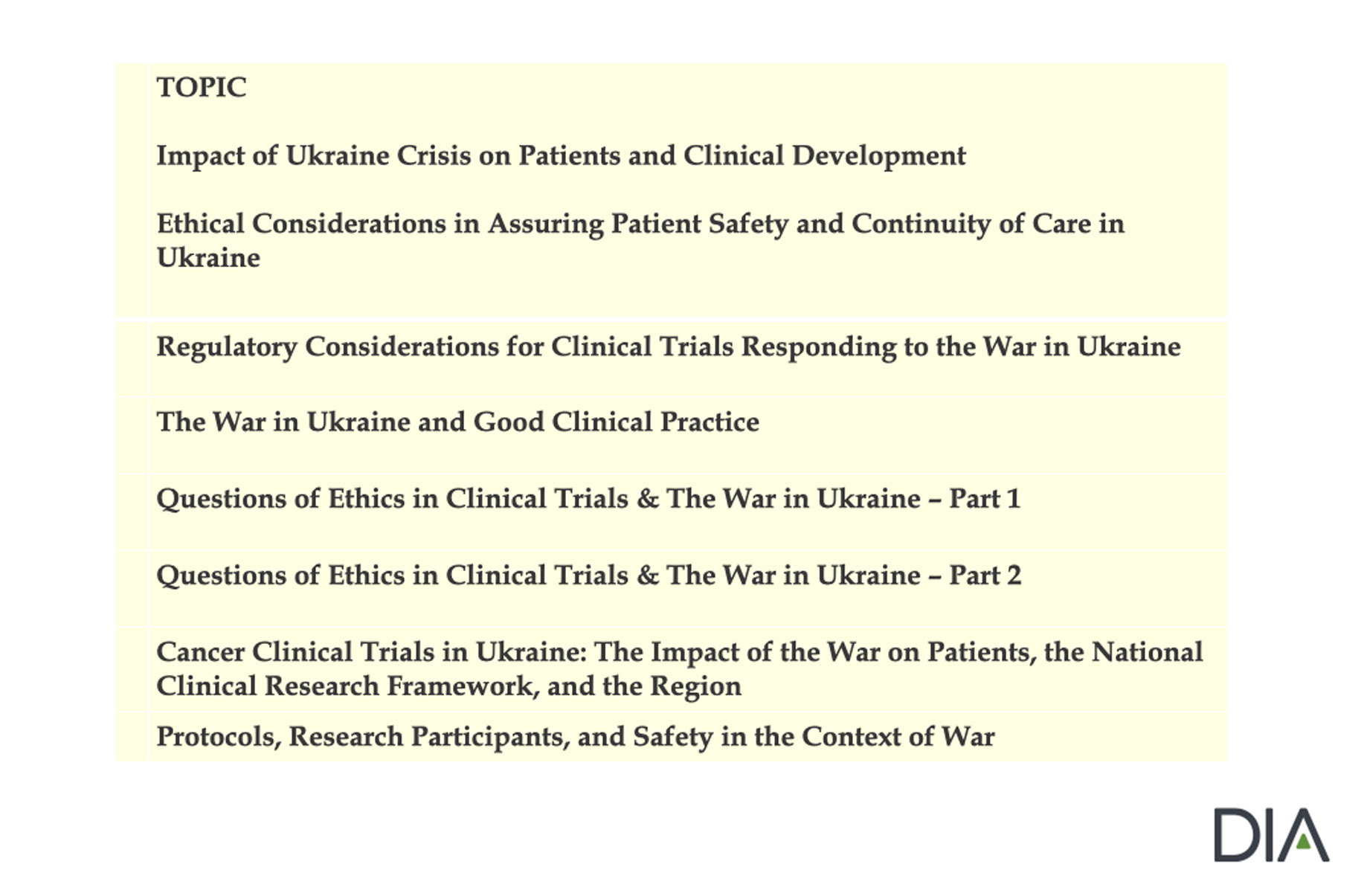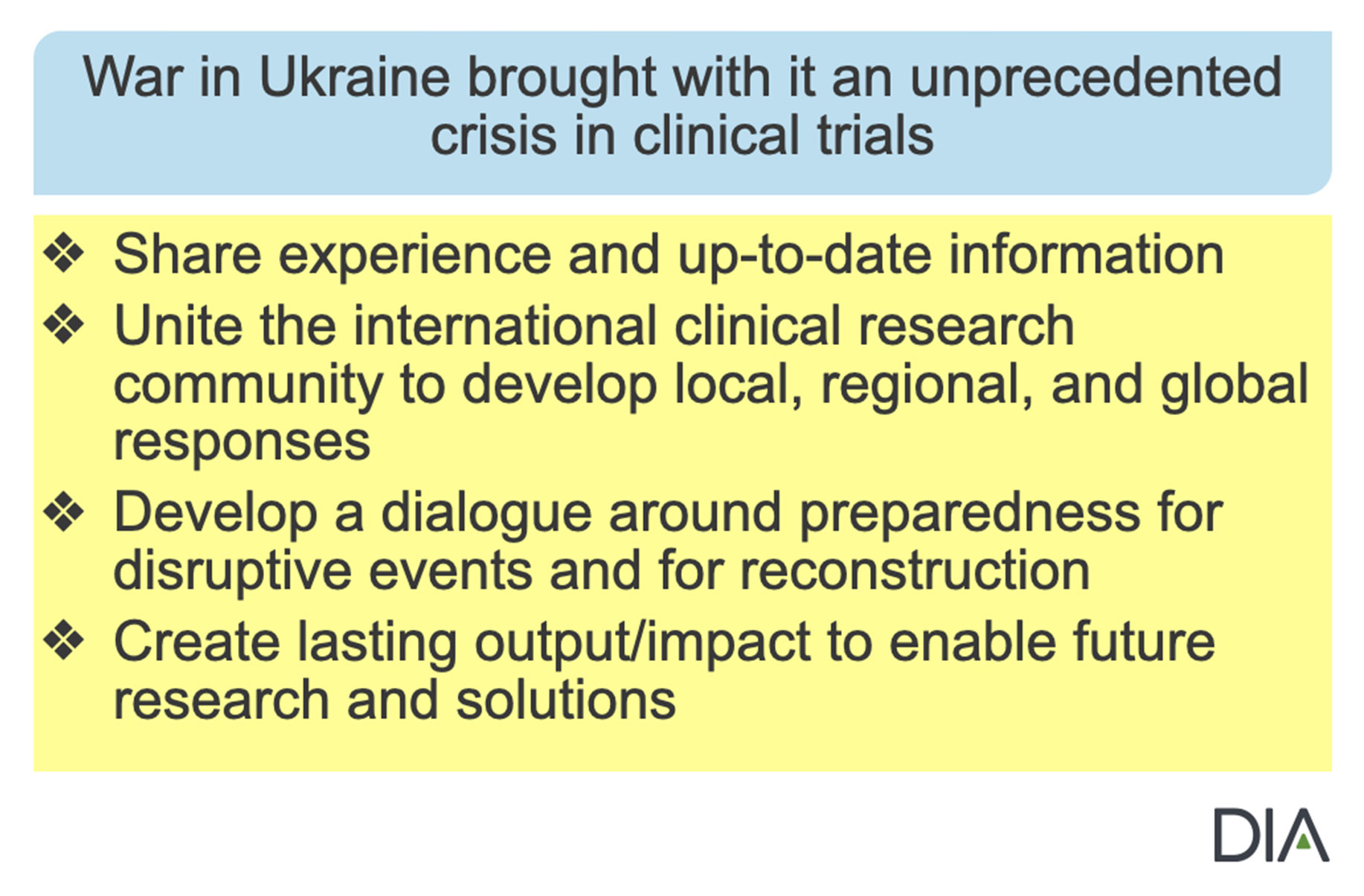Special Section Introduction
Good Clinical Practice Alliance – Europe (GCPA)
Strategic Initiative for Developing Capacity in Ethical Review (SIDCER)
@SIDCER_EU
National University of Pharmacy, Ukraine
Ethics Working Group, International Federation of Associations of Pharmaceutical Physicians and Pharmaceutical Medicine (IFAPP)
he ongoing Russian-Ukrainian war disrupted the global clinical trials and research ecosystem in an unprecedented way, challenging patient safety, continuity of care, and trial integrity. The immediate response of the Ukraine State Expert Center of the Ministry of Health and the clinical research community to maintain the continuity of clinical research and patient care has been exemplary. At the same time, the international clinical research community has come together in a committed and sustained manner to support Ukraine’s clinical research enterprise while remaining engaged in staff and patient support. While we have read and heard much about how the international clinical trials community collectively supported research during the COVID-19 crisis, there is much less awareness of how regulatory, ethics, and medicines support has been provided during this acute crisis in Ukraine.
Ukraine is a stronghold for clinical trials because of its skilled research and medical expertise, culture of collaboration, strong top-quality hospitals and other medical infrastructure (including the presence of high-quality specialized care and care centers), robust and efficient recruitment processes, and the integration of clinical research into its clinical care continuum. As you will read in the following articles, between 200 and 500 clinical trials were reported to be ongoing in Ukraine at the time the war started and, according to ClinicalTrials.gov, approximately 250 active phase 3 trials were ongoing in the region in the late spring and early summer of 2022.
DIA/UCRSI Ukraine Webinar Series

The research community responded swiftly and authoritatively to ensure continued access for participants who were able and elected to continue in their clinical trial during the war. Research entities, governments, patient advocacy groups, as well as individuals coordinated to relocate patients, protect patient and provider safety, and allow for continued participation where possible. Many of these activities happened directly inside Ukraine under extremely difficult conditions thanks to the efforts of deeply committed researchers and other clinical trial professionals as well as regulatory and ethics leadership. Examples of coordinated efforts include the Ukraine Society of Clinical Oncology (USCO), formed during the war to create research pathways and enable research collaboration; and the UCRSI, formed during the war to consider the ethical considerations of clinical research in these circumstances and the need for future action to protect the clinical trial enterprise and ensure continuity during other armed conflicts. Importantly, regulatory bodies responded quickly and continue to provide the support needed to ensure safety and continuity of clinical research and care.
New ethical frameworks are needed to guide research activities during times of war. Existing ethical frameworks generally guide us to avoid research in uncertain times. These guidelines were created in response to previous research practices that were clearly unethical and must remain in place to prevent repeating the mistakes of the past. However, responding to crises in ways that best serve patients and public health requires research. Furthermore, patients who rely on clinical trial protocols should not be forced to “simply move” to off-protocol treatments due to external events. The international community of researchers and ethicists must develop new, reliable frameworks for clinical research in crisis situations, including the crises of geopolitical conflict. Ukraine is showing us that this is not only necessary but possible.
Webinar Series Purpose

The medical research enterprise—not only clinical trials but certainly clinical trials—is an essential structure within societies today. It relates to the ethics of responding to the realities of disease and suffering and to the healthcare needs of individuals and populations. Medical research is not a luxury but rather an essential element of modern society because:
- Clinical research is an essential element of modern medicine. We would not have safe, efficacious medicine in society without research, including creation and exploration of medical knowledge to respond to individual and population health needs.
- Clinical research is a vital component of science. Medical research contributes to scientific knowledge on human biology and health and other aspects of living.
- Clinical research is part of our education systems. Medical research is the foundation for medical education and contributes to many other (if not all) life sciences.
- The medical research enterprise creates a profession that is now an essential part of medicine. Stopping research would remove an important profession from medicine, science, and education.
- The medical research enterprise is an essential part, a sine qua non, for public health systems. The stronger your research enterprise is, the stronger your public health infrastructure will be (a lesson that the previous 25 years of research in Ukraine teaches us anew).
- The research enterprise is a part of an industry that contributes to economic development as well as to the generation of knowledge and healthcare products. It contributes to building a healthy workforce. It is impossible to imagine a healthy society without a healthy medical research enterprise.
These fundamental concerns with the value and practice of clinical research are discussed and shared by experts in the following articles. Part one of this special section addresses the importance of clinical trial and research continuity with examples from the oncology and rare disease communities and provides an overview of ethical considerations supported by voices that can sometimes be overlooked in these discussions. Industry perspective from the International Federation of Associations of Pharmaceutical Physicians and Pharmaceutical Medicine (IFAPP) Ethics Working Group and Association of Contract Research Organizations (ACRO) in part one reinforces the ethical imperative of research continuity in Ukraine.
Capturing and learning from the activities of the past year will also help develop the tools needed to assure the ethical, ongoing delivery of healthcare and research during future disruptions. Part two of this special section in our April 2023 Global Forum will focus on how we can address the issues presented in part one. These articles will include an overview of Good Clinical Practice (GCP), several GCP-specific perspectives from different types of research and research support organizations and the Ukraine Ministry of Health State Expert Center (MoH SEC), and a multi-author piece on protecting clinical trial participant safety during the war.
Thank you for reading this two-part series on clinical research in Ukraine. We also thank every organization that contributed to these expert discussions with our colleagues from Ukraine and the international community.
DIA Thanks These Organizations for Their Contributions to Clinical Research in Ukraine Webinar Series
ARENSIA Exploratory Medicine LLC, Ukraine
Austrian Agency for Health and Food Safety GmbH (AGES)
Clinical and Diagnostics Centre, Ukraine
Clinical Trials Assistance LLC, Ukraine
conect4children
DIA Bioethics Community
Dnipro State Medical University, Ukraine
European Medicines Agency (EMA), The Netherlands
EURORDIS – Rare Diseases Europe, France
Good Clinical Practice Alliance – Europe (GCPA)
GCP Association of Poland
International Federation of Associations of Pharmaceutical Physicians and Pharmaceutical Medicine (IFAPP)
IQVIA
Johnson & Johnson
Kings College London, UK
Labcorp Drug Development, Poland
Melanoma Patient Network Europe (MPNE)
MSD, Ukraine
National Cancer Institute, Ukraine
Pratia, Ukraine
Roche, Switzerland
Semmelweis University, Hungary
State Expert Center of the Ministry of Health of Ukraine
Strategic Initiative for Developing Capacity in Ethical Review (SIDCER), Belgium
Trinity College Dublin, Ireland
Ukrainian Clinical Research Support Initiative (UCRSI)
University of Liverpool, UK
Vision Zero Cancer
WCG
World Health Organization (WHO), Switzerland

